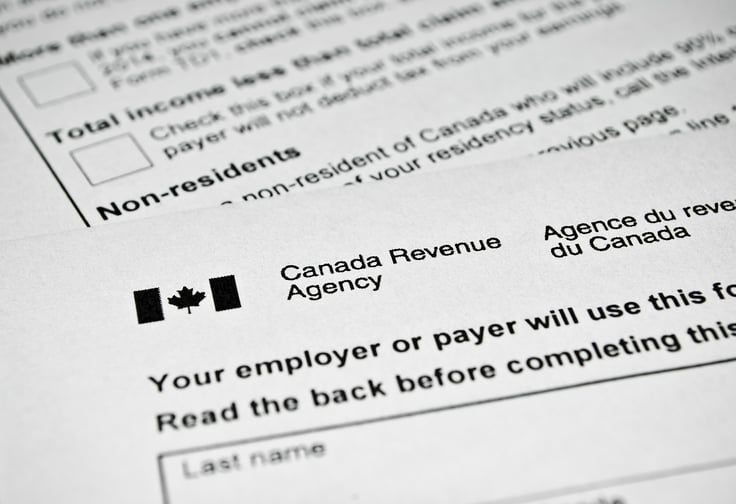Wolseley PRO Pipeline Blog
Knowing when to charge GST (Goods and Services Tax) and HST (Harmonized Sales Tax) can be a big question mark when you take the leap to running your own contracting business. As a business owner in the trades, you have to be accountable for your business income, expenses, tax papers and payments.
So, what do you need to know about Canadian taxes and when to charge GST on invoices?
Here are a few things for plumbing and HVAC contractors to keep in mind when it comes to invoicing customers:
Small Business: Sole Proprietorship and Independent Contractor
Whether you’re a solo contractor or manage a team, you are the owner of a small business. If you are working for yourself and procuring jobs where you are in charge, you are considered a sole-proprietor in your income taxes. On the other hand, you can also be considered an independent contractor if you are contracted by a company to do work for them and their clients.
You can be both a sole proprietor and an independent contractor at the same time.
Contractor Taxes vs Employee Taxes
As a small business owner and contractor, your taxes will look different than the typical employee taxes. Because you are either finding your own jobs or are being contracted by a company to do work, your contractor tax paperwork is not the same type of paperwork as if you were an employee, simply because your mode of operation is different.
The big difference between yourself an employee: you are taking on your own commercial activities such as bringing tools to the job, preparing your own transportation and creating your own schedule. Employees are different because they are not responsible for handling or paying for these commercial activities nor do they have the luxuries of creating their own schedule and payment systems.
Start With A GST/HST Number
Just because your small business operates differently than other businesses, your business is not exempt from paying taxes or claiming tax benefits. Just like other larger businesses, you will need to keep track of payments and tax claims, however, the organization of your payments and claims will look different. The first thing that changes, is your need for a GST/HST number.
A GST/HST number will allow you to charge GST and HST on your invoices for the labour and materials you supply your clients. When you begin your business, it’s a good idea to register for a GST/HST, regardless of how much business you’re bringing in. In Canada, you can register for a GST/HST number online with the Business Registration Online, by calling Canada Revenue Agency or by printing out the form from Canada Revenue Agency and mailing the completed form.

There are some things to know about when to charge GST and HST:
When To Charge GST/HST
There are some things to know about when to charge GST and HST. If your small business is making more than $30,000 in the year (4 consecutive quarters) or after the first quarter, your business is eligible to charge, collect and remit GST and HST for the services you provide and the materials needed.
You must register for a GST/HST number within the first 29 days of making $30 000 in the year and actively use the number provided on your invoices, payroll and accounting system and tax correspondences with Canada Revenue Agency.
GST and HST charges are made on both the labour and the cost of materials. Many contractors choose to charge the GST or HST on the cost of the whole project. Others will break down their invoice to show the cost of labour and materials, especially if the client is paying the for the materials out of their own pocket. In this scenario, the materials are not taxable, only the labour is.
How To Charge GST/HST Across Canada
Make sure that you review the charges for GST/HST for the Canadian province or territory you are working in. For example, in the provinces of Ontario, Nova Scotia, New Brunswick, Prince Edward Island, and Newfoundland and Labrador, you must charge HST (Harmonized Sales Tax) because they have combined the goods and service tax with the regional tax.
Here’s a list to reference for the GST/HST rates in each Canadian province and territory:
|
Province |
HST |
GST |
|
British Columbia |
5% |
|
|
Alberta |
5% |
|
|
Saskatchewan |
5% |
|
|
Manitoba |
5% |
|
|
Ontario |
13% |
|
|
Quebec |
5% |
|
|
New Brunswick |
15% |
|
|
Nova Scotia |
15% |
|
|
Prince Edward Island |
15% |
|
|
Newfoundland and Labrador |
15% |
|
|
Northwest Territories |
5% |
|
|
Yukon |
5% |
|
|
Nunavut |
5% |
Claiming GST/HST From Business Costs
Because you are responsible for making all purchases for your business, you can also claim back the GST/HST on “purchases and expenses you use, consume or supply in commercial activities”. This means you can claim purchases like your business license, creating a website for your business, buying ads, buying tools and supplies. These claims even extend to your home if you use a room in your home for meetings with clients or conducting business. You’ll be able to deduct portions of your electricity, mortgage, internet, and maintenance costs directly related to that room in your home.
When Contractors Need the T5108 Form
If you are a small business contractor working in the construction industry, it’s important also important to have knowledge about the T5108 form from Canada Revenue Agency. Here’s who needs to use the form:
If you are an individual, partnership, trust, or corporation involved in construction activities which provide your primary source of business income and you make payments to subcontractors for construction services, you must report amounts paid or credited (whether by cheque, cash, barter, or offset against an amount owing).
So, if you are a small business owner and you have subcontractors working for you and you are paying them over $500 per job, this form and information must be submitted to the CRA in addition to your business taxes.
Knowing Important Tax Information
As a small business owner, you need to keep track of your taxes and paperwork to ensure you are providing accurate paperwork and monetary amounts to the CRA. Each year, you will have until June 15 to file your taxes unless you have a balance owing, in which case, the balance must first be paid by April 30th.
If understanding taxes and when to charge GST and HST on invoices is a daunting task for you, talk to a tax consultant or an accountant. They can help you determine what you should be doing with your taxes and can even help you benefit from tax credits with their thorough understanding of the Canadian tax system.
For more helpful tips on your contracting business, sign up to be a Wolseley PRO. You’ll receive the latest industry news, right to your inbox!








